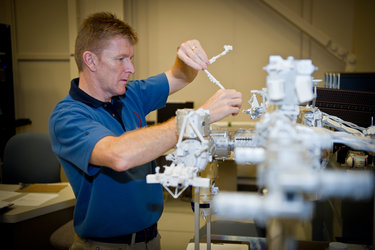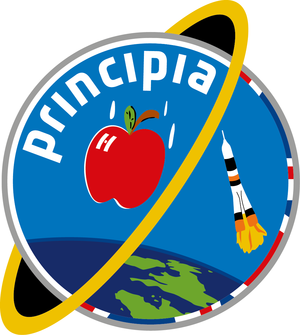Revealed: Principia’s space seeds results
Seeds flown in space grow less well than their Earth-bound counterparts – and the most likely culprit is radiation. This and other findings were presented by the Royal Horticultural Society at a schools conference held in Portsmouth, UK, on 2 November.
ESA’s Jason Hatton notes, “Radiation is the biggest risk for dormant seeds stored for a long time in space because cosmic rays are so energetic. When they strike the International Space Station there is a shower effect when they fragment and become even more energetic.
“They can penetrate the Station and interact with any biological material onboard. They either pass through the seed or deposit energy there. They can fragment further once inside the seed, too, which leads to greater damage.”
The full results are available in the report Rocket Science: Our Voyage of Discovery.
The experiment investigated if space travel affected the germination and growth of the seeds and whether this could help us to understand more about how astronauts might be able to grow their own food on long space missions or even another planet in the future.

After several months in space with ESA astronaut Tim Peake on his Principia mission aboard the orbital complex, the seeds were returned to Earth and sent to 86oo UK schools and children’s organisations, together with a batch of identical seeds that remained on Earth.
Unaware which packet contained the space seeds, these young space biologists nurtured their rocket seedlings between April and June 2016, taking specified measurements and carefully recording their data.
From the Rocket Science experiment we learn that seeds that have survived both the rigours of a journey to space and being stored for several months are still viable and can germinate and grow.
This finding takes scientists closer to knowing whether astronauts could grow edible crops on long space missions and potentially harness the power of plants to sustain future space colonies.

Dr Alistair Griffiths of the Royal Horticultural Society said: “Knowing that the seeds were largely unaffected by extraterrestrial factors will add to research looking into how astronauts could become self-sufficient gardeners in space and ultimately on other planets.
“Further research has to be done to help us understand the impact of space-gardening on the nutritional value of plants and the psychological benefits particular plants can bring to astronauts who, if they are venturing to Mars, will be away from Earth for several years.”
Rocket Science, a collaboration with the Royal Horticultural Society in partnership with the UK Space Agency, saw a million Eruca sativa rocket seeds totalling 2 kg launched to the Space Station as part of Tim Peake’s six-month mission.
The project was designed to raise the profile of science, technology, engineering and mathematics (STEM) subjects in schools and inspire a new generation of horticultural scientists.
Tim said: “I hope that this project and my Principia mission have inspired you to study STEM subjects throughout your time at school or college.
“There are many exciting and rewarding careers out there waiting for you. If you work hard and aim high, there is no reason why you cannot achieve your dreams.
I want to say a huge thank you to every single young person who took part in this project. I had great fun watching your photos and messages pour in via Twitter while I was working on board the International Space Station.
“It was brilliant to see you all enjoying being part of such a fascinating science experiment – and a spot of gardening too!”







